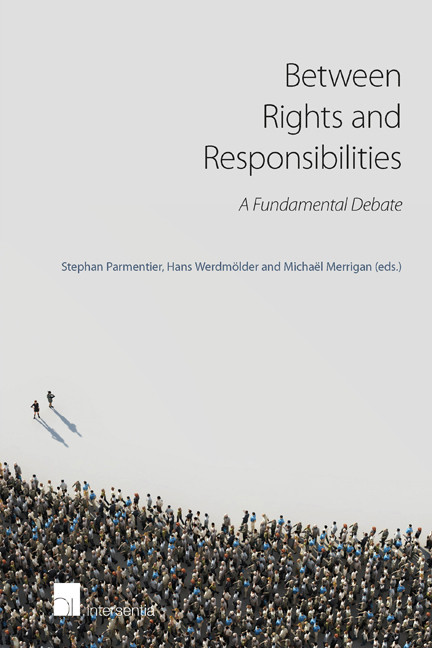Book contents
- Frontmatter
- Foreword
- Contents
- About the Authors
- Introduction: Towards an Integrated Vision of Rights and Responsibilities
- PART I FUNDAMENTAL RIGHTS AND FUNDAMENTAL RESPONSIBILITIES: SETTING THE SCENE
- PART II RIGHTS AND RESPONSIBILITIES IN SPECIFIC CONTEXTS
- Human Rights in a Globalising Economy. Is the Right to Social Protection Qualified by a Duty to Work?
- Human Rights in a Globalising Economy. Rights and Responsibilities of Trade Unions
- Fundamental Rights and Responsibilities within a Multicultural Society
- From Lawless to a Human Rights Approach in the Fight Against Terrorism. The Council of Europe Standards
- Children's Rights at a Dignitarian Horizon of Responsible Parenthood
- Individuals’ Duties in the African Human Rights Protection System. Challenges and Prospects
- Declaration of Human Duties and Responsibilities
Individuals’ Duties in the African Human Rights Protection System. Challenges and Prospects
from PART II - RIGHTS AND RESPONSIBILITIES IN SPECIFIC CONTEXTS
Published online by Cambridge University Press: 22 November 2017
- Frontmatter
- Foreword
- Contents
- About the Authors
- Introduction: Towards an Integrated Vision of Rights and Responsibilities
- PART I FUNDAMENTAL RIGHTS AND FUNDAMENTAL RESPONSIBILITIES: SETTING THE SCENE
- PART II RIGHTS AND RESPONSIBILITIES IN SPECIFIC CONTEXTS
- Human Rights in a Globalising Economy. Is the Right to Social Protection Qualified by a Duty to Work?
- Human Rights in a Globalising Economy. Rights and Responsibilities of Trade Unions
- Fundamental Rights and Responsibilities within a Multicultural Society
- From Lawless to a Human Rights Approach in the Fight Against Terrorism. The Council of Europe Standards
- Children's Rights at a Dignitarian Horizon of Responsible Parenthood
- Individuals’ Duties in the African Human Rights Protection System. Challenges and Prospects
- Declaration of Human Duties and Responsibilities
Summary
The African human rights protection system is the youngest of the three established regional human rights systems, the other two being the European and the Inter-American systems. The defining differences between the African human rights framework and the other two regional human rights systems stem from the desire on the part of the African people to preserve traditional African values. This desire is evidenced by the special importance attached to the protection of the family, the preservation of moral values and the definition of both rights and duties of individuals. The purpose of this article is to provide an insight into the actual and potential role of the concept of individual duties in the African Charter on Human and Peoples’ Rights (the African Charter or the Banjul Charter).
This contribution attempts to pigeonhole and analyse the duties under the African Charter to show that not all duties have the same efficacy and should be treated in the same way. While some individual duties have legally binding value, others are merely supererogatory moral obligations, devoid of legal effect; while some are quite clear in their import, others are plainly vague; and while some have a content which can be ascertained, others do not.
The chapter is divided into three main parts. The first part examines the historical background to the establishment of the African Charter. This historical overview is necessary to set the discussion into context. After all, as Sloth- Nielsen and Mezmur advise, ‘[i]n order to understand the ‘language of duties’ in the African human rights system, one needs to have an informed view of the general conception of human rights in Africa.’ The second part focuses on the distinguishing attributes of the African Charter and, in particular, those aspects which are generally perceived as its main weaknesses. This section essentially highlights the main differences between the African human rights system and the other major human rights systems. The third and final part considers the duties pertaining to individuals listed in the African Charter. An analysis will be made as to why the inclusion of duties in the Charter in the manner it was is generally considered at least somewhat problematic, but also why this can be regarded as an opportunity for the African continent and, by extension, for the global human rights framework to redefine itself.
- Type
- Chapter
- Information
- Between Rights and ResponsibilitiesA Fundamental Debate, pp. 187 - 228Publisher: IntersentiaPrint publication year: 2016



